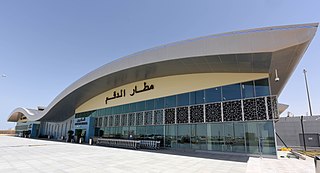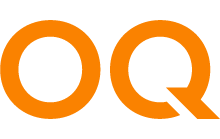Related Research Articles

The economy of Oman is mainly centered around its oil sector, with fishing and trading activities located around its coastal regions. When oil was discovered in 1964, the production and export increased significantly. The government has made plans to diversify away from oil under its privatization and Omanization policies. This has helped raise Oman's GDP per capita continuously in the past 50 years. It grew 339% in the 1960s, reaching a peak growth of 1,370% in the 1970s. Similar to the pricing of all other commodities, the price of oil is subject to significant fluctuations over time, especially those associated with the business cycle. A commodity's price will rise sharply when demand, like that for oil, outpaces supply; meanwhile, when supply outpaces demand, prices will fall.
This article is about transport in Oman.
Petroleum Development Oman (PDO) is the leading exploration and production company in the Sultanate of Oman. The Company delivers the majority of the country's crude oil production and natural gas supply. The company is owned by the Government of Oman, Royal Dutch Shell (34%), TotalEnergies (4%) and Partex (2%). The first economic oil find was made in 1962, and the first oil consignment was exported in 1967.

The hydrogen economy is an umbrella term that draws together the roles hydrogen can play alongside low-carbon electricity to decarbonize those sectors and activities which may be technically difficult to decarbonize through other means, or where cheaper and more energy-efficient clean solutions are not available. In this context, hydrogen economy encompasses hydrogen's production through to end-uses in ways that substantively contribute to phasing-out fossil fuels and limiting climate change.

Al Wusta Governorate is one of the governorates of Oman. Its capital city is Haima. It was previously a region ('mintaqah'), before becoming a governorate on 28 October 2011.

Duqm is a port town on the coastal strip of the Arabian Sea open to the Indian Ocean. It is about 550 km from Muscat. As of 2017, the population was approximately 12,000.

India–Oman relations are foreign relations between the Republic of India and the Sultanate of Oman. India has an embassy in Muscat, Oman. During British rule in India, Bombay presidency controlled Oman for the British Empire. An Indian consulate was opened in Muscat in February 1955 which was upgraded to a consulate general in 1960 and later into a full-fledged embassy in 1971. The first ambassador of India arrived in Muscat in 1973. Oman established its embassy in New Delhi in 1972 and a consulate general in Mumbai in 1976. India and Oman have had trade and people-to-people ties for several millennia. Oman is home to a large Indian expatriate community and for Oman, India is an important trading partner. Politically, Oman has been supportive of India's bid for permanent membership of the United Nations Security Council.

The Port of Duqm, also known as Duqm Port, is a seaport and road terminal located at Duqm in the Al Wusta governorate of Oman. Duqm Port, integrated in the Special Economic Zone at Duqm (SEZAD), and located 550 kilometres south of capital Muscat, is equipped with a ship repair yard and dry dock facility. Overlooking the Arabian Sea and the Indian Ocean, the Port of Duqm is a joint-venture between ASYAD Ports and Consortium Antwerp Port. Although operating since 2012, it was not officially opened until 4 February 2022 by Mr. Asa'ad bin Tariq Al Said, Deputy Prime Minister for International Relations and Cooperation Affairs and Personal Representative of His Majesty the Sultan of Oman.

Duqm Airport is an airport serving the Arabian Sea port of Duqm in the Al Wusta Region of Oman.

OQ, formerly known as Oman Oil Company, is an energy investment company headquartered in Muscat, Oman. It is a wholly owned subsidiary of the Government of Oman through the Oman Investment Authority.

Energy use in Oman was 381 TWh in 2020, almost double the consumption in 2010.
Oman Tourism Development Company (OMRAN) is a Government owned company mandated to drive the investment, growth and development of the tourism sector in the Sultanate of Oman. Established in 2005, they are the master developers of major tourism, heritage and urban developments.
MB Holding Company LLC is an Omani conglomerate with interests in oil and gas exploration and production, oilfield services, engineering and mining.
SalamAir is a low-cost airline from Oman headquartered and based at Muscat International Airport.
Oman Rail is a railway company responsible for rail transport in Oman. It is owned and operated by the Omani Ministry of Transport. The company is based in Al Qurum, Muscat.
Green hydrogen (GH2 or GH2) is hydrogen produced by the electrolysis of water, using renewable electricity. Production of green hydrogen causes significantly lower greenhouse gas emissions than production of grey hydrogen, which is derived from fossil fuels without carbon capture.

The United Kingdom Joint Logistics Support Base (UKJLSB) is a military base located within the Al Duqm Port and Drydock of Duqm in the Al Wusta governorate of Oman. As a British overseas military base, it is used to facilitate the deployment of the British Armed Forces in the Persian Gulf and Indian Ocean, along with the wider British maritime operations in the region.

The Omani-British Joint Training Area is a training area established in 2019 for joint military training between Oman and the United Kingdom. It is also used as a Land Regional Hub for expeditionary warfare by the British Army.
Duqm Refinery is an oil refinery at the port town of Duqm in central-eastern Oman, and is expected to have a capacity of 230,000 barrels per day. It is owned and operated by OQ8, a joint venture between OQ, a subsidiary of the Government of Oman, and Kuwait Petroleum International, a subsidiary of Kuwait Petroleum Corporation.
References
- ↑ Prabhu, Conrad (2021-11-29). "Oman eyes FID for HYPORT Duqm green hydrogen project in 2023". Oman Daily Observer . Retrieved 2022-03-28.
- ↑ "Kick-off of the HYPORT® Duqm Green Hydrogen Project". DEME . Retrieved 2022-03-28.
- ↑ "Uniper boards HYPORT Duqm green hydrogen project in Oman". Renewablesnow.com. Retrieved 2022-03-28.